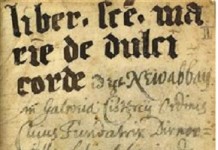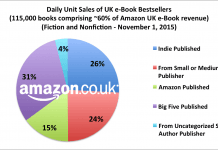 The Bookseller is devoting headline space to the contribution by UK authors – most of them neither Scottish nor resident in Scotland – to an open letter signed by “over 200 great names” on behalf of the Let’s Stay Together campaign, which aims to give “a voice to everyone who doesn’t have a vote in the decision to break up Britain,” in the runup to the historic referendum on Scottish independence in September. British historian and author Tom Holland, who has also written an extensive piece in the New Statesman on the issue, is organizing the letter campaign in partnership with history TV presenter Dan Snow.
The Bookseller is devoting headline space to the contribution by UK authors – most of them neither Scottish nor resident in Scotland – to an open letter signed by “over 200 great names” on behalf of the Let’s Stay Together campaign, which aims to give “a voice to everyone who doesn’t have a vote in the decision to break up Britain,” in the runup to the historic referendum on Scottish independence in September. British historian and author Tom Holland, who has also written an extensive piece in the New Statesman on the issue, is organizing the letter campaign in partnership with history TV presenter Dan Snow.
J.K. Rowling, one of the highest-profile literary supporters of the No campaign to keep Scotland in the UK, is not on the list. However, others, like novelist and philosopher Alain de Botton, broadcaster and author Melvyn Bragg, crime writer Ruth Rendell, and historian Sir Max Hastings, are – as well as less likely figures like pop icons Bryan Ferry and Sir Mick Jagger. There seems to be a dearth of Scottish-born writers among the signatories, although historian William Dalrymple does feature, but this is not to imply that the majority of Scots writers are pro-independence – simply that the organizers of this campaign and most of the literary signatories aren’t. (Military author and signatory Andy McNab, despite his Scottish pseudonym, is not a Scot.)
One distinguishing feature of the Scottish independence campaign so far, though, is the intellectual and literary firepower that has lined up behind it. Internationally renowned Scottish author Alasdair Gray went as far as penning Independence: An Argument for Home Rule, to put forward his version of the case for independence. (That said, former prime minister Gordon Brown also laid out his version of the Unionist case in My Scotland, Our Britain: A Future Worth Sharing.) Celebrated father of the Tartan Noir genre William McIlvanney has published a pamphlet Dreaming Scotland on his support for independence. And poet Edwin Morgan practically bankrolled the Scottish National Party during some of its critical years. From a more current, even (God forbid), hip perspective, Irvine Welsh has come out as a passionate supporter of independence. And with all these writers and many more, you don’t have to dig very deep to see how far a sense of Scottish identity and a distinct cultural heritage have powered and enriched their imaginations. Nationalist movements worldwide, not least in Gaelic near neighbor Ireland, have enriched the entire human corpus with irreplaceable works of literature – just so in Scotland.
Above all, the National Collective, uniting “artists and creatives for Scottish independence,” has provided a rallying point for cultural, intellectual, and artistic figures that the No campaign has struggled to equal. It’s also distinguished by its highly intelligent, critical stance, towards sacred cows of the independence movement as well as the totems of Unionism. The tone of the best and broadest-minded of the Unionist campaign, however, is better represented by this kind of well-meaning but woolly appeal from the Let’s Stay Together website: “We believe that the key missing message is a positive, emotional one: not telling the Scottish electorate what to do or what not to do, but telling them how we feel about Scotland, about being part of the UK and about our collective place in the world.”
Many Britons living outside Scotland may feel a strong sense of affinity and sympathy with the nation, owing to the long centuries of shared history. Sympathy, however, is not sovereignty. Democracy requires that the people who are entitled to decide an issue are those actually on the ground within a territory, else outsiders can impose whatever outcome they want under the guise of a numerical majority. We can see versions of the latter principle at work in the Ukraine and Tibet.
For writers and creative figures as well, there’s the awkward question of whether you can claim a nation as part of your cultural heritage without actually living there or being part of it. Perhaps you can. But to move from that point to arguing that you have a claim on choices about its future, while continuing to reside elsewhere, strikes me as an argument too far. I expect to see many Unionists try to continue to make it, though.


































“For writers and creative figures as well, there’s the awkward question of whether you can claim a nation as part of your cultural heritage without actually living there or being part of it. Perhaps you can. But to move from that point to arguing that you have a claim on choices about its future, while continuing to reside elsewhere, strikes me as an argument too far.”
lol, what kind of an argument is that supposed to be? That’s like saying you can’t claim Bath as part of your national heritage unless you move to Bath. What’s in question with Scottish independence is precisely whether Scotland gets to be a nation of its own or not, and of course that is something very relevant to everyone living in the UK, a nation Scotland has been part of for the trifle of, oh, several centuries.
The Daily Mash has also covered this story, in its own inimitable style: (Profanity alert!)
http://www.thedailymash.co.uk/news/international/scots-welcome-smug-english-twat-letter-2014080789393